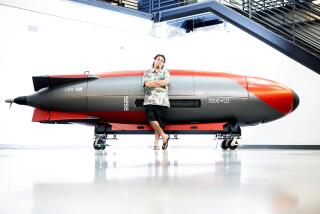Houston Firm to Construct First Private Space Factory
- Share via
A fledgling Houston firm has won the backing of the National Aeronautics and Space Administration to build and operate the first free-flying commercial component of an orbiting space station.
The agreement with Space Industries Inc., whose officers include former astronaut Joseph P. Allen and other former NASA officials, will buffer the firm from competition until it begins earning money.
Launching Fees Deferred
Space Industries will own the platform, to be launched from the space shuttle in 1989, but NASA has agreed to defer collecting launching fees until the company begins earning revenues.
The platform will be designed to serve as an unmanned, automated factory for firms that want to rent space aboard an orbiting facility to manufacture substances in a weightless environment. NASA Administrator James M. Beggs said that it represents the beginning of the industrialization of space.
“We hope the (platform) will be the first of many such platforms to be built by private industry to complement the permanently manned space station and to lead, eventually, to an industrial park in space,” Beggs said at a news conference in Washington.
However, the agreement signed Tuesday provides that no other firms will be given quite the same treatment, Beggs and company spokesmen said. Under what a company executive described as a “first-to-market protection plan,” NASA will give the firm an edge over possible competitors by deferring the cost of the launching until money starts coming in.
Investment Protected
“Once we start earning revenues, NASA will take 12%” until the launching costs are recovered, said David Langstaff, chief financial officer of Space Industries Inc. He said that the agreement guarantees that no other company will share that advantage, thus protecting a considerable investment.
“The market risk is a substantial one,” Langstaff said. The platform, which is being financed entirely with private funds, is expected to cost between $250 million and $500 million.
In time, Beggs and other NASA officials hope to see many commercial facilities in space as part of an ambitious, multinational plan to build a permanently manned space station. Crews from the space station could service unmanned facilities aboard platforms that would travel alongside the manned station.
Unmanned Facility
Although the plans for the platform announced Tuesday call for an unmanned facility, it will be equipped with a pressurized work area that could be manned whenever the platform is alongside the station.
Max Faget, president of Space Industries Inc. and a former NASA executive, said that the platform should be ready to be put in orbit by 1989, allowing four years for the firm to line up commercial customers. He refused to discuss financing for the project, but he said no federal funds are involved.
Potential customers for the platform include firms that manufacture substances of a high “value to weight” ratio that could be manufactured more efficiently in a weightless environment. That could include the mixing or processing of materials--such as certain pharmaceuticals--free of the distorting effect of gravity.
More to Read
Inside the business of entertainment
The Wide Shot brings you news, analysis and insights on everything from streaming wars to production — and what it all means for the future.
You may occasionally receive promotional content from the Los Angeles Times.










